Key takeaways:
- Understanding international sales regulations is essential for compliance, fostering trust with partners, and avoiding costly mistakes.
- Thorough research on country-specific requirements and effective communication are crucial for successfully navigating the complex landscape of international sales.
- Leveraging technology for regulation tracking can streamline compliance management, enhance decision-making, and mitigate risks associated with regulatory changes.
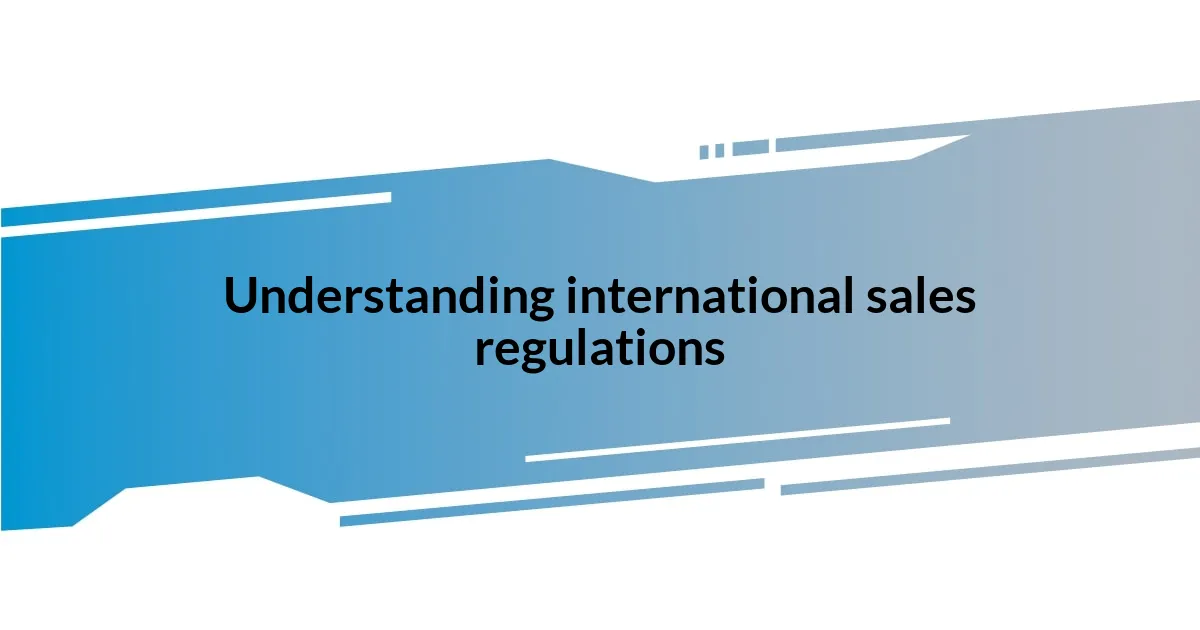
Understanding international sales regulations
When diving into international sales regulations, I often found myself overwhelmed by the sheer magnitude of differing laws across countries. Have you ever tried to decipher a legal document that feels like it was written in an entirely different language? I remember sitting at my desk, staring at regulations from multiple countries, and feeling an urge to pull my hair out. It was a reality check about how essential it was to grasp these regulations; without understanding them, the risks of compliance violations loomed large.
One critical aspect I learned is that not all regulations are created equal. Each country may have unique requirements regarding product standards, labeling, and even payment methods. For example, in my experience with sales in the European Union, I had to navigate regulations that were not only stringent but also constantly evolving. This meant that staying updated was part of the job. It felt like a never-ending puzzle, but breaking it down slowly made the process more manageable.
Additionally, I discovered that understanding international sales regulations is not simply about avoiding fines; it’s about fostering trust with your international partners. I vividly recall a partnership that nearly fell apart due to misunderstanding import regulations. That incident reinforced my belief that clear communication about regulations creates a solid foundation for successful international business. Isn’t it fascinating how these legal frameworks shape our professional relationships?
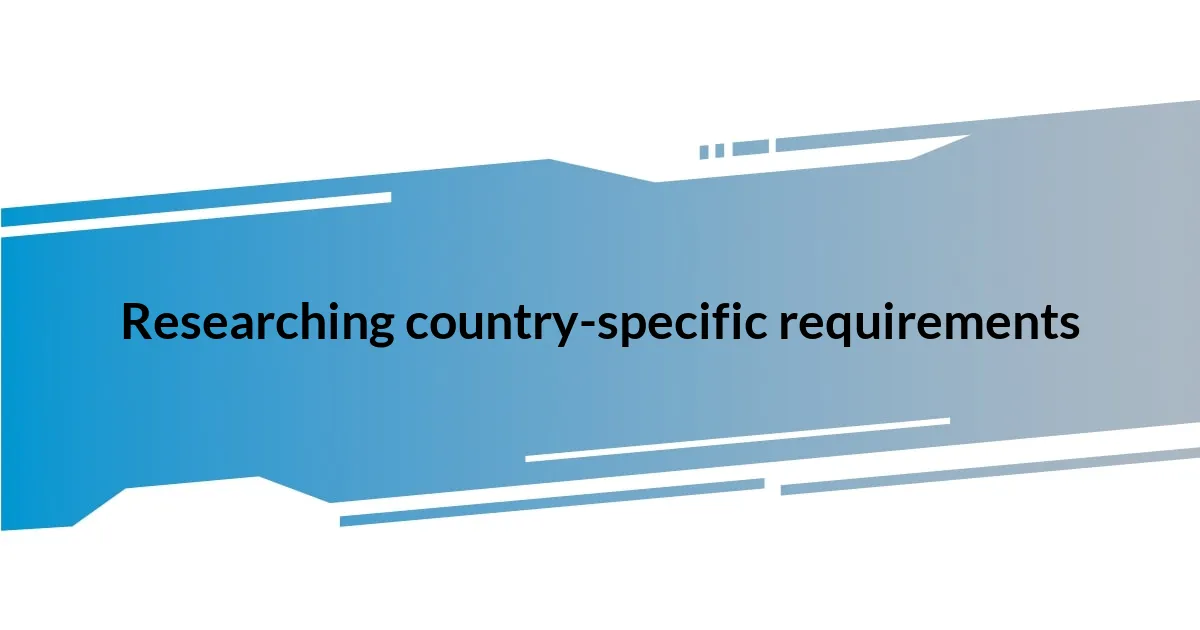
Researching country-specific requirements
Researching the country-specific requirements for international sales can often feel like piecing together a complex jigsaw puzzle. I’ve had instances where a simple question about tariffs spiraled into an intricate web of regulations that required hours of research. One time, I stumbled upon unexpected restrictions in a country I planned to enter, which, fortunately, I discovered early on. It was a real eye-opener that highlighted the importance of digging deep into local laws before making any commitments.
As I delved deeper into my research, I learned that resources could vary widely, from governmental trade offices to industry-specific associations. I found government websites particularly helpful; they often provided clear guidelines on import/export duties and compliance. In one case, accessing a local trade association’s report gave me invaluable insights about cultural nuances in product presentation. It made me realize that understanding isn’t just about laws—it’s about connecting with customers through shared expectations.
To give you a clearer perspective, here’s a comparison of two different countries’ requirements that really illustrates the point:
| Country | Key Requirements |
|---|---|
| Germany | Extensive labeling laws, CE marking for compliance, and data protection regulations |
| Brazil | In-depth import licensing processes, varying tax rates, and specific health regulations |
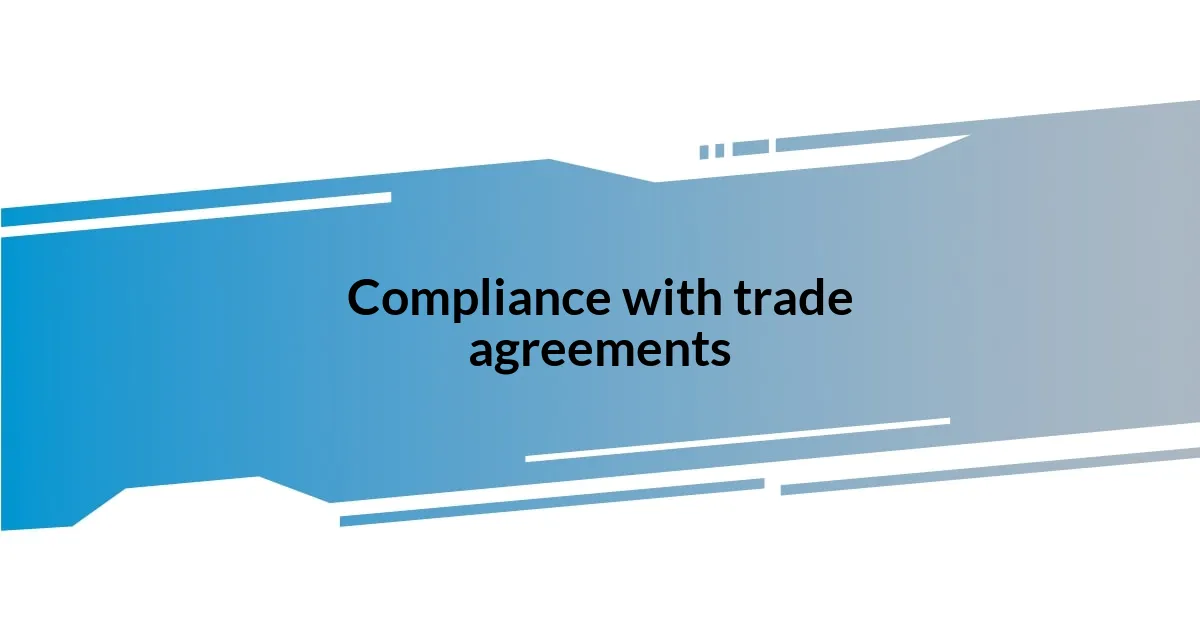
Compliance with trade agreements
As I started working with international trade agreements, I quickly realized how crucial compliance is for a smooth operation. I remember a time early in my career when I overlooked a minor detail in a trade agreement with a distribution partner. The implications were significant; it not only strained our relationship but also delayed our shipment by weeks. This experience underscored my belief that compliance isn’t just about following rules—it’s about building trust and credibility in the global market.
To ensure compliance with trade agreements, you might consider the following:
- Understand specific obligations: Each trade agreement may contain unique stipulations regarding tariffs, quotas, or procedures that you must follow.
- Stay updated on changes: Trade agreements can evolve, so it’s essential to keep an eye on policy updates that may affect your operations.
- Train your team: Ensure your team is well-versed in compliance requirements to avoid common pitfalls or misunderstandings.
- Utilize trade resources: Don’t hesitate to lean on government and industry resources for clarity on compliance standards. They can serve as excellent guides for navigating international regulations.
- Establish a feedback loop: Encourage communication with partners to discuss compliance issues, which could help catch potential problems early.
These steps can help you navigate the complexities of trade agreements effectively, allowing you to focus on growing your business internationally.
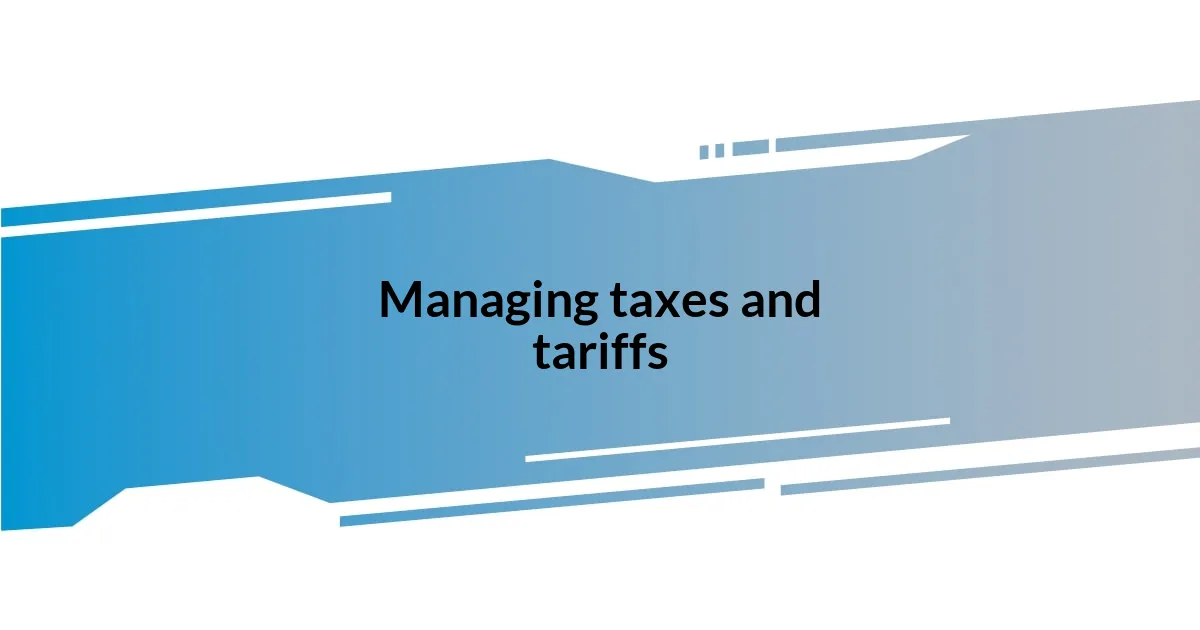
Managing taxes and tariffs
When it comes to managing taxes and tariffs, I’ve often found it can feel like walking through a minefield. One memorable experience was when I thought I had calculated all my costs for a shipment to Canada. Just as I was ready to send everything off, I learned about an additional provincial sales tax that came as quite a shock. It taught me that staying ahead of local tax regulations is crucial; even a small oversight can eat into your margins dramatically.
Delving into the world of tariffs, I discovered just how essential it is to classify your products correctly. For instance, I once labeled a textile product under a different category, resulting in higher tariffs that I hadn’t budgeted for. This error made me realize how vital careful research and maintaining accurate classification documentation can be; it’s not just a matter of saving money, but also ensuring smoother customs clearance and avoiding unnecessary delays.
I often wonder how other businesses tackle these challenges. Do they have dedicated teams, or do they rely on external consultants? Personally, I’ve found that connecting with local experts can yield significant advantages. I remember reaching out to a customs broker who not only guided me through the complex tax landscape but also shared insights that I wouldn’t have discovered on my own. Building those relationships can transform what feels like an overwhelming process into a collaborative effort, making international sales much more manageable.
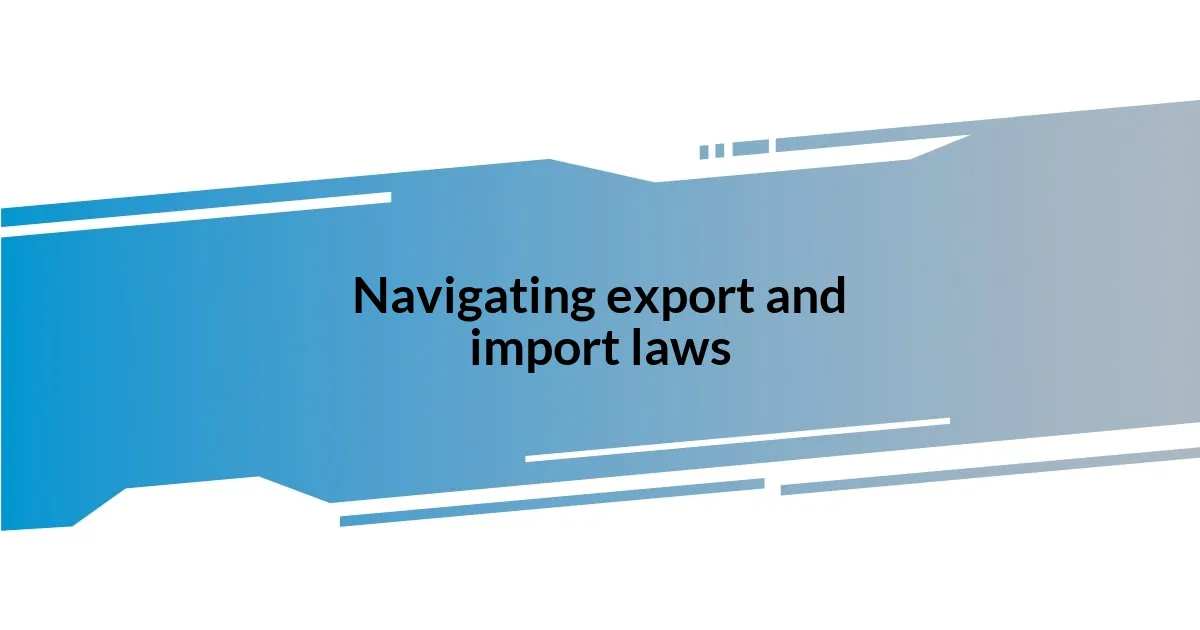
Navigating export and import laws
Navigating export and import laws was a challenging yet enlightening journey for me. I vividly recall a project where I was moving goods into a Central American country. I underestimated the complexities of their import laws, especially concerning necessary licenses and permits. This oversight resulted in my shipment being held up for days, which taught me a valuable lesson about thoroughly researching import regulations before proceeding. Have you ever faced similar delays? It’s moments like these that can really shed light on the importance of understanding the legal landscape.
As I delved deeper into this arena, I discovered that working closely with local legal experts was vital. I remember enlisting the help of a consultant who had a wealth of knowledge regarding regional regulations. Thanks to their insights, I was able to navigate the intricate web of export laws and avoid potential pitfalls. I’ve found that having someone on the ground who understands the nuances can make all the difference. It’s one piece of advice I often share with others venturing into international sales.
Moreover, I learned that keeping comprehensive records is essential. For example, after mishaps with incomplete paperwork that resulted in fines, I created a checklist that included all necessary documentation for each shipment. It became my go-to reference, saving me time and preventing future headaches. How many of us can say we’ve completely mastered this process? The answer lies in continuous learning and adapting, as each experience brings new challenges that contribute to our growth in navigating these complex laws.
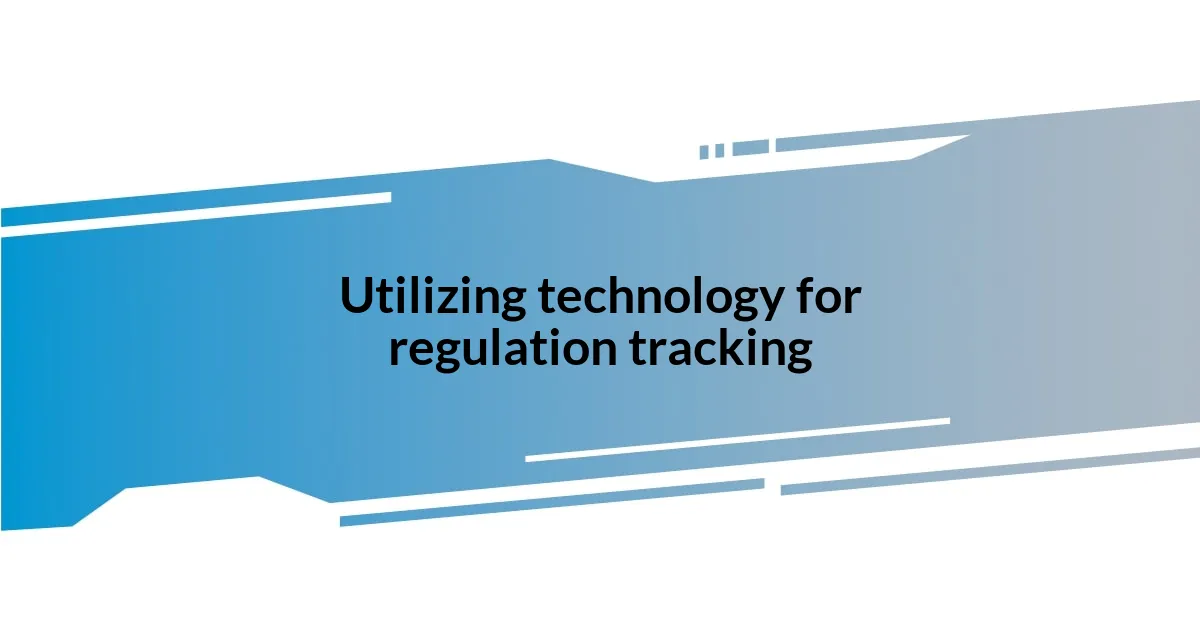
Utilizing technology for regulation tracking
Utilizing technology for tracking regulations has been a game-changer for me. I vividly recall when I first started using software tools designed specifically for compliance management. The moment I integrated these systems, I noticed an immediate difference in how quickly I could access updated regulations. It turned a once-overwhelming task into something almost effortless. Isn’t it incredible how technology can simplify complex processes?
Moreover, I’ve grown fond of using automated alerts for regulation changes. For example, during my expansion into European markets, I set up notifications for any updates related to EU import rules. This way, I wasn’t left scrambling at the last minute. Instead, I felt confident and prepared, ready to adjust my strategies as needed. Have you ever had that sinking feeling when new regulations pop up unexpectedly? Those alerts became my safety net.
I’ve also found that using data analytics tools has significantly improved my decision-making. By analyzing patterns in compliance data, I was able to identify which markets posed the most significant regulatory challenges. Armed with this knowledge, I could allocate my resources more efficiently and avoid costly missteps. It’s fascinating how embracing technology has not only saved time but has also allowed me to make well-informed decisions. Wouldn’t you agree that leveraging tech in this way is essential for anyone looking to thrive in international sales?
